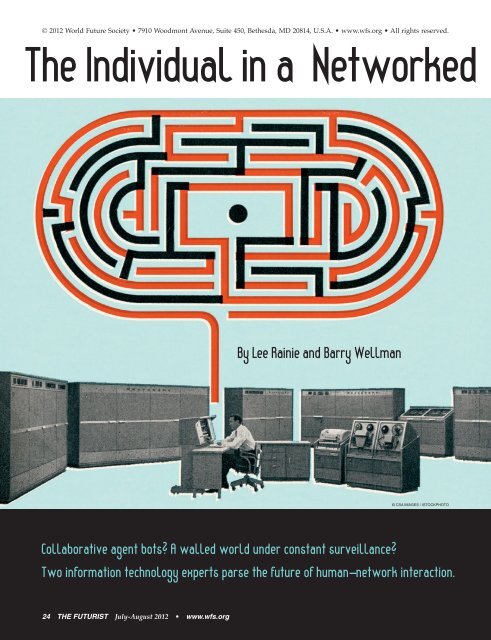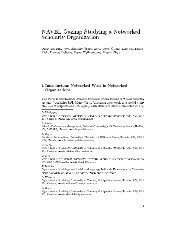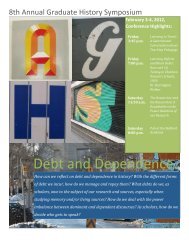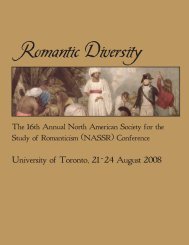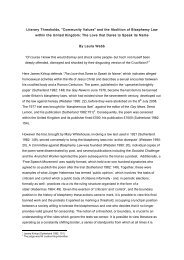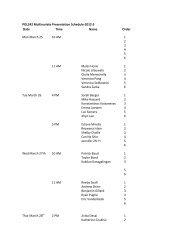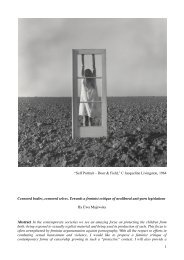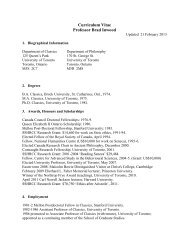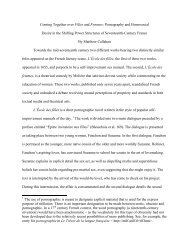The Individual in a Networked World: Two Scenarios - Computing in ...
The Individual in a Networked World: Two Scenarios - Computing in ...
The Individual in a Networked World: Two Scenarios - Computing in ...
- No tags were found...
Create successful ePaper yourself
Turn your PDF publications into a flip-book with our unique Google optimized e-Paper software.
© 2012 <strong>World</strong> Future Society • 7910 Woodmont Avenue, Suite 450, Bethesda, MD 20814, U.S.A. • www.wfs.org • All rights reserved.<br />
<strong>The</strong> <strong>Individual</strong> <strong>in</strong> a <strong>Networked</strong><br />
By Lee Ra<strong>in</strong>ie and Barry Wellman<br />
© CSA IMAGES / ISTOCKPHOTO<br />
Collaborative agent bots A walled world under constant surveillance<br />
<strong>Two</strong> <strong>in</strong>formation technology experts parse the future of human–network <strong>in</strong>teraction.<br />
24 THE FUTURIST July-August 2012 • www.wfs.org
<strong>World</strong>: <strong>Two</strong> <strong>Scenarios</strong><br />
One of the most useful and formal<br />
futurism exercises <strong>in</strong> recent years<br />
was the work <strong>in</strong> 2006–2007 of the<br />
Metaverse Roadmap project. It was<br />
driven by John Smart, Jamais Cascio,<br />
and Jerry Paffendorf, and orig<strong>in</strong>ally<br />
conceived of as a brief for the future<br />
of the <strong>World</strong> Wide Web as it became<br />
three-dimensional.<br />
Once the leaders of the effort began<br />
to hear from several dozen<br />
th<strong>in</strong>kers, their own views branched<br />
<strong>in</strong> other directions. <strong>The</strong>y had started<br />
their <strong>in</strong>quiries with the notion of a<br />
“Metaverse” that was first conceived<br />
by the <strong>in</strong>fluential science-fiction<br />
writer Neal Stephenson <strong>in</strong> his 1982<br />
classic, Snow Crash. To Stephenson,<br />
the Metaverse was an immersive,<br />
virtual space with 3-D technologies.<br />
Yet, the Metaverse Roadmap<br />
th<strong>in</strong>kers went beyond see<strong>in</strong>g the<br />
Metaverse as a virtual doma<strong>in</strong>. <strong>The</strong>y<br />
saw it as the “convergence of (1) virtually<br />
enhanced physical reality and<br />
(2) physically persistent virtual<br />
space. It is a fusion of both, while allow<strong>in</strong>g<br />
users to experience it as either.”<br />
In other words, it is the connection<br />
of the physical and virtual<br />
worlds. Although we do not foresee<br />
people liv<strong>in</strong>g mostly <strong>in</strong> virtual space,<br />
the technological directions suggested<br />
by the Metaverse Roadmap<br />
provide guides for how networked<br />
<strong>in</strong>dividualism may proceed.<br />
This is a future that has already<br />
come to pass <strong>in</strong> many respects. <strong>The</strong>re<br />
is already a mad rush <strong>in</strong> Silicon Valley<br />
to create products to embed social<br />
<strong>in</strong>terplay <strong>in</strong> most k<strong>in</strong>ds of <strong>in</strong>formation<br />
and media encounters, and it<br />
will likely accelerate go<strong>in</strong>g forward.<br />
Moreover, <strong>in</strong> com<strong>in</strong>g years a wider<br />
Metaverse will emerge as relatively<br />
ord<strong>in</strong>ary objects—as well as computers<br />
and phones—will become ubiquitously<br />
networked with each other,<br />
and networked <strong>in</strong>dividuals will be<br />
able to augment their <strong>in</strong>formation<br />
through direct contact with databases<br />
and objects that have become<br />
smarter and more communicative.<br />
Increased comput<strong>in</strong>g power may<br />
make people’s <strong>in</strong>volvements <strong>in</strong> virtual<br />
worlds more immersive and<br />
compell<strong>in</strong>g, although experiences to<br />
date suggest that people are more<br />
apt to use computer networks that<br />
<strong>in</strong>tegrate with real life rather than<br />
becom<strong>in</strong>g totally immersed <strong>in</strong> virtual<br />
worlds—with virtual game<br />
players the exception.<br />
Ubiquitous comput<strong>in</strong>g, sometimes<br />
called “the Internet of th<strong>in</strong>gs” (or<br />
“everyware”), describes human–<br />
computer <strong>in</strong>teraction that goes beyond<br />
personal comput<strong>in</strong>g to an environment<br />
of objects process<strong>in</strong>g<br />
<strong>in</strong>formation and network<strong>in</strong>g with<br />
each other and humans. Objects<br />
would share <strong>in</strong>formation: appliances,<br />
utility grids, cloth<strong>in</strong>g and jewelry,<br />
cars, books, household and<br />
workplace furnish<strong>in</strong>gs, as well as<br />
build<strong>in</strong>gs and landscapes. <strong>The</strong>y<br />
would learn additional <strong>in</strong>formation<br />
and preferred methods of use by<br />
gather<strong>in</strong>g data about people who are<br />
<strong>in</strong> their environment. For example,<br />
cars could tell each other not to be <strong>in</strong><br />
the same lane at the same time, and<br />
bicycles could tell car doors not to<br />
open suddenly when the bikes pass by.<br />
With all these trends roll<strong>in</strong>g along<br />
<strong>in</strong>to the future, there is still reason to<br />
be uncerta<strong>in</strong> about how the environment<br />
of networked <strong>in</strong>dividuals will<br />
evolve. We offer two different scenarios<br />
that seem credible.<br />
Scenario 1: Collaborative Agents<br />
In Augmented Reality<br />
Wak<strong>in</strong>g up <strong>in</strong> a networked future,<br />
his digital agent’s soft voice slowly<br />
grows <strong>in</strong>to Harry Sanchez’s hear<strong>in</strong>g<br />
range. It’s been monitor<strong>in</strong>g his sleep<br />
rhythms and cross-referenc<strong>in</strong>g them<br />
with data from his ongo<strong>in</strong>g bra<strong>in</strong><br />
scans to see when it’s most appropriate<br />
to wake him. After stretch<strong>in</strong>g and<br />
rubb<strong>in</strong>g the sleep from his eyes,<br />
Harry suddenly and happily recalls<br />
yesterday’s purchase.<br />
He found a collaborative coupon<br />
on the Web the other day for a deal<br />
on a new pair of augmented reality<br />
(AR) contact lenses and the haptic<br />
feedback implant that everyone’s<br />
been rav<strong>in</strong>g about. <strong>The</strong> implantation<br />
was a simple and quick outpatient<br />
procedure that rem<strong>in</strong>ded him more<br />
of gett<strong>in</strong>g his ears pierced than of<br />
surgery. It was performed remotely<br />
by a doctor whose robot mimicked<br />
his every move. It was not as though<br />
Harry could really tell, however,<br />
s<strong>in</strong>ce his AR glasses had “sk<strong>in</strong>ned”<br />
(covered) the robot with the doctor’s<br />
virtual image. In this way, the doctor<br />
efficiently treats dozens of patients a<br />
day, project<strong>in</strong>g <strong>in</strong> from his home.<br />
Now that he is awake, Harry eagerly<br />
slips <strong>in</strong> his new AR contact<br />
lenses for the first time. <strong>The</strong>y <strong>in</strong>stantly<br />
network with his microcomputer,<br />
smartphone, and the Internet.<br />
His personalized augmented overlay<br />
appears <strong>in</strong> his field of vision: the<br />
time and date, the weather and air<br />
quality, a few applications he left<br />
www.wfs.org • THE FUTURIST July-August 2012 25
open from the previous night m<strong>in</strong>imized<br />
<strong>in</strong>to his peripheral vision, a<br />
fa<strong>in</strong>tly bl<strong>in</strong>k<strong>in</strong>g icon notify<strong>in</strong>g him of<br />
some messages he missed overnight,<br />
an icon notify<strong>in</strong>g him of <strong>in</strong>formation<br />
updates on news stories aggregated<br />
for him by his agent, and an Inter-<br />
Face lifelog update show<strong>in</strong>g what<br />
his friends did last night that is<br />
cross-referenced with the media they<br />
consumed and the tagged conversations<br />
they had. He sees a call for participat<strong>in</strong>g<br />
<strong>in</strong> a political smart mob <strong>in</strong><br />
the virtual world, but he tells his<br />
agent to disregard it.<br />
His agent also warns him about<br />
his health.<br />
Harry hasn’t been sleep<strong>in</strong>g well,<br />
as his late-night virtual meet<strong>in</strong>gs<br />
with colleagues <strong>in</strong> Ch<strong>in</strong>a have taken<br />
a toll on his system. Yet, he’s happy<br />
to not have to fly there ever s<strong>in</strong>ce<br />
they’ve been able to collaborate<br />
long-distance by us<strong>in</strong>g the Cavecat<br />
productivity system with active<br />
walls and tables hold<strong>in</strong>g spreadsheets,<br />
texts, draw<strong>in</strong>gs, and videos.<br />
As Harry settles <strong>in</strong> at the kitchen<br />
table, the surface notices that he’s<br />
put down his morn<strong>in</strong>g cup of coffee.<br />
F<strong>in</strong>ally, the news displays as manipulable<br />
augmented reality overlays of<br />
Harry’s social network, with pictures<br />
of each network member bl<strong>in</strong>k<strong>in</strong>g<br />
when she or he posts messages,<br />
videos, or lifelog entries.<br />
<strong>The</strong> new haptic implant gives him<br />
a sensory understand<strong>in</strong>g of the<br />
news: He can feel the cont<strong>in</strong>u<strong>in</strong>g battle<br />
<strong>in</strong> Kabul, experienc<strong>in</strong>g its sounds<br />
and vibrations as if he were at the<br />
scene. And it now feels as if the computer<br />
icons of his various applications<br />
have weight and texture. Hav<strong>in</strong>g<br />
not found any urgent messages,<br />
Harry’s agent organizes his correspondence<br />
by topic and relevance.<br />
Notic<strong>in</strong>g a conversation he had that<br />
he does not want many network<br />
members to see, Harry has his agent<br />
make the <strong>in</strong>formation private across<br />
his entire InterFace network. His<br />
agent also sends out a quick update<br />
to his entire network, lett<strong>in</strong>g them<br />
know his plans for the day.<br />
Harry is distracted by a knock<strong>in</strong>g<br />
sound. His agent <strong>in</strong>forms him that his<br />
best friend, Neal, is project<strong>in</strong>g <strong>in</strong> for<br />
their regular weekend virtual breakfast.<br />
Though Harry and Neal only live<br />
50 kilometers apart, this is a nice<br />
way for them to check <strong>in</strong> on one another<br />
and spend some time together.<br />
Harry hasn’t shaved, and so he puts<br />
on his sh<strong>in</strong>y-face sk<strong>in</strong> before he<br />
opens the virtual door. He uses his<br />
new haptic chip to get the sensation<br />
of shak<strong>in</strong>g his friend’s hand. It’s a<br />
little strange at first, s<strong>in</strong>ce there’s<br />
noth<strong>in</strong>g actually present to shake,<br />
but his nervous system responds as<br />
though he had reached out and<br />
touched someone.<br />
Harry and Neal chat about how everyone<br />
who was at the pub’s avatar<br />
party last night has shared record<strong>in</strong>gs<br />
of the even<strong>in</strong>g with friends. <strong>The</strong>ir<br />
agents have already automatically<br />
tagged these record<strong>in</strong>gs with relevant<br />
<strong>in</strong>formation about people and location.<br />
Avatar parties have become popular<br />
these days. Everyone dresses like<br />
their favorite game character; some<br />
even come look<strong>in</strong>g like one another. It<br />
can be a lot of fun role play<strong>in</strong>g like<br />
this, and the collected and tagged<br />
videos are highly amus<strong>in</strong>g as people’s<br />
voices, looks, and even smells can be<br />
altered <strong>in</strong> the virtual world.<br />
After visualiz<strong>in</strong>g and flipp<strong>in</strong>g<br />
through these tags for mentions of his<br />
name, Harry updates the conversation<br />
file with some witty th<strong>in</strong>gs he<br />
thought of after the fact, and his<br />
agent forwards the updates to the relevant<br />
people. He also tells his agent<br />
to delete <strong>in</strong>formation about last<br />
night’s embarrass<strong>in</strong>g ice-cube escapade<br />
at the avatar party, and to ask<br />
his friends to delete their versions.<br />
Harry’s agent softly chimes <strong>in</strong> just as<br />
he’s say<strong>in</strong>g goodbye to Neal, rem<strong>in</strong>d<strong>in</strong>g<br />
him that he has to meet his sister<br />
Merril today. <strong>The</strong> agents settle on a<br />
place downtown. Harry projects himself<br />
<strong>in</strong>to the restaurant’s virtual space.<br />
<strong>The</strong> restaurant keeps a good onl<strong>in</strong>e<br />
presence, with a nice menu, list of <strong>in</strong>gredients,<br />
health report, and real-time<br />
webcam view. It’s local and the tables<br />
there get automatically reserved.<br />
As Harry gets ready for the day, his<br />
agent presents him with a few cloth<strong>in</strong>g<br />
options. He decides to wear the<br />
new trousers suggested by his girlfriend,<br />
but calls up another app to<br />
make sure his sister would also approve.<br />
Harry’s girlfriend had tagged<br />
the <strong>in</strong>fo to the trousers while do<strong>in</strong>g<br />
some virtual w<strong>in</strong>dow shopp<strong>in</strong>g and<br />
had a pair <strong>in</strong> his size set aside after<br />
ask<strong>in</strong>g his belt how big it was.<br />
Not want<strong>in</strong>g to be late, Harry has<br />
his agent arrange a car for him<br />
through a collaborative consumption<br />
app that recognizes his high trust<br />
score. He rarely uses a car, as his<br />
fridge automatically schedules grocery<br />
deliveries. Slipp<strong>in</strong>g his microcomputer<br />
<strong>in</strong>to his pocket, Harry<br />
goes to the car, has his agent set the<br />
restaurant’s coord<strong>in</strong>ates, and leans<br />
back to check his messages as the car<br />
pulls out.<br />
Scenario 2: A Walled and<br />
Surveilled <strong>World</strong><br />
As Will Li rouses himself from<br />
sleep, he walks over to “his” computer<br />
to see what he’s missed overnight.<br />
Truthfully, the computer isn’t<br />
really his: He owns rights to its usage<br />
but isn’t allowed to change its<br />
hardware or software, or else he’d<br />
void his warranty or break the law.<br />
His computer is really only an access<br />
po<strong>in</strong>t, as all his data is <strong>in</strong> the cloud,<br />
yet another th<strong>in</strong>g that’s owned—<br />
with all the data <strong>in</strong> it—by a big corporation.<br />
Before Will can reach for<br />
the cloud, the system completes its<br />
mandatory scan of his computer for<br />
viruses and copyright <strong>in</strong>fr<strong>in</strong>gement.<br />
<strong>The</strong> price of media access has also<br />
spawned its own subculture of media<br />
pirates. <strong>The</strong>y usually meet <strong>in</strong><br />
person, shar<strong>in</strong>g m<strong>in</strong>iature portable<br />
terabyte flash drives packed with<br />
music, TV shows, movies, e-books,<br />
and more. <strong>The</strong> pirates often get their<br />
“warez” from people who collected<br />
old computers from trash heaps, recycl<strong>in</strong>g<br />
centers, and garage sales.<br />
<strong>The</strong>y’ve even developed a code language<br />
to arrange meet-ups, but Will<br />
hardly keeps up with the ever-evolv<strong>in</strong>g<br />
l<strong>in</strong>go.<br />
Lean<strong>in</strong>g over his morn<strong>in</strong>g coffee,<br />
Will dreams of how nice it would be<br />
to have a personal agent, but he’s<br />
heard most are double agents that<br />
also report back to the authorities<br />
and sell <strong>in</strong>formation to corporations.<br />
And he doesn’t like the way Face-<br />
Wall is collect<strong>in</strong>g all the <strong>in</strong>formation<br />
on him whenever he uses it. He also<br />
can’t afford to hire the technician it<br />
would require to help him set up the<br />
devices and access all the fragmented<br />
networks of media sites,<br />
search eng<strong>in</strong>es, and social applications<br />
onl<strong>in</strong>e. Each has a tricky “right<br />
26 THE FUTURIST July-August 2012 • www.wfs.org
to <strong>in</strong>formation” form to sign. So he’s<br />
reduced his onl<strong>in</strong>e presence to a<br />
m<strong>in</strong>imum, try<strong>in</strong>g to limit himself to<br />
good old-fashioned e-mails and<br />
avoid social media.<br />
However, Will needs to use Face-<br />
Wall today to f<strong>in</strong>d someth<strong>in</strong>g. He’s<br />
forced to wait thirty seconds to let<br />
the mandatory ad play. It has his picture<br />
<strong>in</strong> it. CoffeeCo must have<br />
bought a recent photo that tagged<br />
him on a friend’s wall. Will notices<br />
that his system slows down as the<br />
massive data file from the advertisement<br />
clogs up his bandwidth, but<br />
s<strong>in</strong>ce the corporations pay more to<br />
guarantee themselves fast access, he<br />
endures the wait.<br />
It’s almost ironic to see a return to<br />
the days of load<strong>in</strong>g screens s<strong>in</strong>ce the<br />
amount of available bandwidth has<br />
only <strong>in</strong>creased, but all that bandwidth<br />
is auctioned at sky-high prices<br />
or owned by a few companies. F<strong>in</strong>ally<br />
f<strong>in</strong>d<strong>in</strong>g the photo, Will learns<br />
he cannot delete it because CoffeeCo<br />
now owns it. Perhaps he should<br />
make sure no one ever uploads anyth<strong>in</strong>g<br />
about him aga<strong>in</strong>, though that<br />
would be difficult. Most people<br />
seem to put up with these situations<br />
because they want to keep go<strong>in</strong>g onl<strong>in</strong>e.<br />
Will assumes that from now on<br />
he’ll get peppered with ads geared<br />
to the tastes that FaceWall has observed<br />
onl<strong>in</strong>e—both for him and for<br />
all those other 40-year-olds who became<br />
unemployed when countries<br />
set up their own walled-off Internets,<br />
claim<strong>in</strong>g that morality and national<br />
security demanded it.<br />
Giv<strong>in</strong>g the situation further<br />
thought, Will starts to browse his<br />
friends’ profiles, and f<strong>in</strong>ds that his<br />
sister Lorelei is earn<strong>in</strong>g extra money<br />
by sell<strong>in</strong>g her personal <strong>in</strong>formation<br />
to FaceWall, <strong>in</strong>clud<strong>in</strong>g l<strong>in</strong>ks to his<br />
profile. Maybe that’s how CoffeeCo<br />
found his photo. He’ll ask her when<br />
they meet today to never do it aga<strong>in</strong>.<br />
You can never be quite sure of who’s<br />
<strong>in</strong>form<strong>in</strong>g on you, only <strong>in</strong> this case<br />
it’s not only the state but data-aggregat<strong>in</strong>g<br />
organizations.<br />
Will remembers from history class<br />
how, <strong>in</strong> the 1960s, FBI Director<br />
J. Edgar Hoover had used his dossiers<br />
on the Kennedys to keep<br />
power. Now, FaceWall has even<br />
more comprehensive dossiers on everyone.<br />
Do<strong>in</strong>g what he knows he<br />
shouldn’t, Will reaches for a doughnut.<br />
Maybe he can sneak one without<br />
his <strong>in</strong>surance company’s sensors<br />
register<strong>in</strong>g it. At least Will made the<br />
right decision by pay<strong>in</strong>g extra for<br />
their privacy clause. Otherwise, his<br />
health data might have just been<br />
sold off to the highest bidder at an<br />
<strong>in</strong>fo auction. But, s<strong>in</strong>ce he’s not able<br />
to see the <strong>in</strong>formation himself, he<br />
can’t be sure.<br />
Will and his best friend, Spider,<br />
prefer to meet <strong>in</strong> person: <strong>The</strong>re is<br />
less chance for any number of th<strong>in</strong>gs<br />
happen<strong>in</strong>g. <strong>The</strong>y remember how<br />
Spider was once duped by someone<br />
pass<strong>in</strong>g himself off as an onl<strong>in</strong>e <strong>in</strong>surance<br />
representative to steal private<br />
<strong>in</strong>formation. <strong>The</strong> latest scam is<br />
reverse-identity theft. <strong>The</strong> thieves<br />
pose as old friends, us<strong>in</strong>g detailed<br />
avatars whose digital image and<br />
voice have been reconstructed from<br />
public profiles. Too bad the government<br />
killed the trusted identities<br />
program. Will shuts off the computer<br />
monitor, grabs his phone and his<br />
travel pass, and goes out past the security<br />
scanner.<br />
After a wait, Lorelei pulls up, giggl<strong>in</strong>g<br />
about the whole-body security<br />
scan at the gate. “Hope they got a<br />
better picture this time.” She’s also<br />
worried that maybe the guards had<br />
found the <strong>in</strong>crim<strong>in</strong>at<strong>in</strong>g photo of her<br />
onl<strong>in</strong>e. She’s already lost one job because<br />
of it, even though it was taken<br />
without her permission and out of<br />
context. <strong>The</strong>y head off for their meal,<br />
but arrive just <strong>in</strong> time to see the last<br />
open table become occupied.<br />
<strong>The</strong> Possible Futures of<br />
<strong>Networked</strong> <strong>Individual</strong>s<br />
Although present technologies are<br />
still far from realiz<strong>in</strong>g either scenario<br />
<strong>in</strong> its entirety, each represents a potential<br />
evolution from current trajectories.<br />
<strong>The</strong> first scenario assumes a<br />
move toward more networked <strong>in</strong>dividualism<br />
based on cont<strong>in</strong>ued technological<br />
progress and trust <strong>in</strong> computer<br />
and human networks—<strong>in</strong>clud<strong>in</strong>g<br />
the wither<strong>in</strong>g of boundaries.<br />
<strong>The</strong> second scenario assumes more<br />
boundaries, more costs, more corporate<br />
concentration, and more surveillance.<br />
At present, the Western world<br />
is trend<strong>in</strong>g <strong>in</strong> the direction of the<br />
first scenario, but we would be naïve<br />
to th<strong>in</strong>k that the second scenario<br />
could not happen.<br />
What we call the Triple Revolution—<strong>in</strong><br />
social networks, <strong>in</strong> the Internet,<br />
and <strong>in</strong> mobile connectedness—will<br />
change but never end <strong>in</strong><br />
the ongo<strong>in</strong>g turn to a networked operat<strong>in</strong>g<br />
system. <strong>The</strong> foreseeable<br />
future holds the prospect that <strong>in</strong>dividuals<br />
will be able to act more <strong>in</strong>dependently<br />
with greater power to<br />
shape their lives, if they choose to do<br />
so and if the circumstances will enable<br />
them to do so.<br />
Yet, the foreseeable future also conta<strong>in</strong>s<br />
the burden of know<strong>in</strong>g that<br />
people will have to work harder on<br />
their own to get their needs met.<br />
Tightly knit, permanent groups will<br />
cont<strong>in</strong>ue to be stable cores for some,<br />
and social networks will play greater<br />
roles <strong>in</strong> all human activities. <strong>The</strong> work<br />
of networked <strong>in</strong>dividuals is never<br />
quite done—and the satisfactions of<br />
netweav<strong>in</strong>g are always available. ❑<br />
Ra<strong>in</strong>ie Wellman<br />
About the Authors<br />
Lee Ra<strong>in</strong>ie is the director of the Pew<br />
Research Center’s Internet & American Life<br />
Project, a nonprofit, nonpartisan “fact tank”<br />
that studies the social impact of the Internet.<br />
Prior to that he was the manag<strong>in</strong>g editor<br />
for U.S. News & <strong>World</strong> Report. He is deliver<strong>in</strong>g<br />
the open<strong>in</strong>g plenary keynote at<br />
<strong>World</strong>Future 2012, the annual conference<br />
of the <strong>World</strong> Future Society, <strong>in</strong> Toronto,<br />
Canada, July 27-29.<br />
Barry Wellman directs the University of<br />
Toronto’s NetLab, is a member of the Cities<br />
Centre and the Knowledge Media Design Institute,<br />
and is a cross-appo<strong>in</strong>ted member of<br />
the Faculty of Information. Wellman is a member<br />
of the Royal Society of Canada, chairemeritus<br />
of both the Community and Information<br />
Technologies section and the Community<br />
and Urban Sociology section of the American<br />
Sociological Association, and a fellow of IBM<br />
Toronto’s Centre for Advanced Studies.<br />
Excerpted from <strong>Networked</strong>: <strong>The</strong> New<br />
Social Operat<strong>in</strong>g System by Lee Ra<strong>in</strong>ie and<br />
Barry Wellman, published <strong>in</strong> May 2012 by<br />
<strong>The</strong> MIT Press. © 2012 Massachusetts<br />
Institute of Technology. All rights reserved.<br />
Christian Beermann and Tsahi Hayat<br />
co-authored the chapter.<br />
www.wfs.org • THE FUTURIST July-August 2012 27


